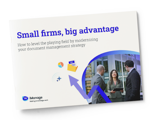Small firms, big advantage
How to level the playing field by modernizing your document management strategy

The opportunity in numbers
A recent survey exposes the gaps between what corporate clients expect from the law firms they hire and reality.
Smaller firms can shine by offering what big firms lack: clarity on costs and processes, consistent matter updates, and responsive communication.
ACC/Everlaw survey
Table of contents
Introduction
Chapter 1. Why law firms need a modern DMS
Limited tools limit future success
Chapter 2. One control point for better-organized information
Responsiveness is paramount to client satisfaction
Chapter 3. Collaborate from anywhere in real time
Bring people and process together to eliminate delays
Chapter 4. Turn knowledge and expertise into collective strength
Go beyond storing files to managing firm knowledge
Chapter 5. Solve digital security and regulatory compliance challenges
Law firms rely on their reputation and the trust of their clients to succeed
Chapter 6. Sharpen your competitive edge and shape your future
Clients expect innovative pricing and new service models

Introduction
As clients seek more personalized and cost-effective legal services, smaller, regional, and boutique firms are experiencing an unexpected surge in popularity.Recent research bears it out:
- Legal work continues to move down-market to smaller firms as clients seek greater efficiency and better value-to-cost balance. (Thomson Reuters)
- Partners in smaller firms now practice in areas usually dominated by larger firms, such as commercial litigation and corporate law. (Above the Law/iManage)
- Competitive salaries in small firms are on the rise. (Above the Law/iManage)
How can you make the most of this trend and use it to spur maximum growth and profitability?
Small firms have a big advantage. You can deliver personalized client service with greater agility than larger firms by maximizing your efficiency, responsiveness, and productivity, while you minimize costs. This drives your competitive edge and increases your profit potential.
But the tools and processes matter. Document management tools significantly impact your firm’s responsiveness and cost-effectiveness if they don’t fully support the work your lawyers do — helping them organize, locate, share, and protect documents and emails. Inadequate tools can make it difficult to collaborate on or use past cases to help new clients, for example.
Documents chart your client relationships, from each matter’s intake to its last billable hour and closing. Each document is a snapshot of the attorney-client interaction, recording the lawyer’s analysis and insights, the client’s questions and concerns, and detailing final decisions, actions, and outcomes.
Imagine a world where you collaborate on legal documents in the same space you communicate. Documents, emails, and chats coexist, accessible from anywhere, anytime. There’s no need to download, upload, or switch between programs. And no more desktop jungle of apps that take forever to load and create distractions. Your team works together in real time, without version control headaches and with the complete picture always in easy reach.
A modern document and email management system (DMS) provides a highly secure environment for your data and client information. The DMS opens the door to unimpeded, real-time collaboration and organized information storage with the benefit of sophisticated document search and retrieval.
Your DMS yields access to a virtual library of contextualized legal expertise. This promotes knowledge sharing and collaboration among colleagues as it unlocks the full breadth of your accumulated experience to support future growth and profitability.
Chapter 1: Why law firms need a modern DMS
Why law firms need a modern DMS
Lawyers spend hours chasing down colleagues, searching repositories, and sifting through a maze of folders, emails, and chat logs to find the information they need to complete their daily tasks. They rarely find it fast enough to meet today’s client service standards, and juggling multiple versions of documents while trying to collaborate via email attachments just adds to the challenge. As work mobility expands in nearly every profession, fast, user-friendly remote access to documents has never been more critical. Clunky VPN access to a firm’s servers is a stark reminder of the limitations of outdated technologies when sluggish response times in high-stakes legal environments can lead to unacceptable results.
Limited tools limit future success
Most firms quickly outgrow the document management capabilities in their practice management solution, or PMS, which often lack features people need to excel in a competitive market. Search functions seldom return all the relevant results, leaving key information buried in overflowing inboxes, meeting notes, and misplaced files. This impedes your ability to collaborate effectively and hinders remote work, reducing your firm’s scope. Lawyers also need sophisticated and flexible document controls that ensure adherence to frequent regulation changes and include version control, audit trails, and secure storage to safeguard sensitive information. You can capitalize on your inherent advantage as a small firm by using an enterprise-grade DMS that is built for agility and scales with your growth. Raising the bar on responsiveness and effective collaboration sets your firm up for future success.
Chapter 2: One control point for better-organized information
How important is a fast response?
A slow response time was the top-rated reason for deciding against hiring a particular lawyer or firm. (Martindale Avvo)

47.6% of law firm customers listed responsiveness as a critical factor in choosing an attorney.

32% of respondents saw a red flag if a lawyer appeared too busy or overly stretched – an impression easily left by slow response times.
Responsiveness is paramount to client satisfaction
Firms achieve instant credibility and build trust by responding to a client’s inquiries quickly, with accurate information. And when your documents are centralized in one place, organized by matter, any member on the team can search past correspondence, agreements, and court documents to find the exact documents and emails they need and provide answers promptly. This is just the beginning of the benefits of a modern cloud DMS.
A user-friendly information hub with intuitive organization and information-sharing capabilities greets lawyers and staff. Everyone logs in to the same system, regardless of location or device, and all authorized users can access stored documents in real time.
Find information fast with advanced search options
Lawyers spend way too much of their workday hunting for information. In an outdated file system, searching document titles for a word or phrase is like looking for a needle in a haystack.
A modern DMS lets you build greater value into your documents by storing them with something called “metadata tags” which are a way to record relevant details with the document. You can add multiple metadata tags when you are generating or saving your documents and keep their treasure trove of information close at hand with an easy way to call them back later in a search.
The most modern DMS uses an automated process that can classify documents based on content, type, case, and other criteria, saving you an average of 3.5 minutes per document.
Refine your searches with granular filtering capabilities
Do you need to find all contracts drafted by a specific partner last year? Are you looking for all discovery requests sent to one defendant in a multi-party litigation?
Go straight to the relevant information and:
- Replicate past success. Fine-tune your search and quickly find the specific case and associated documents.
- Unearth hidden expertise. Search by case, matter, knowledge, and document types to identify relevant experts based on prior work.
- Find documents 7 minutes faster. Your filing structure can mirror your work habits for quicker, more intuitive searches. (Forrester Consulting)
Control who views and edits your documents.
With just a few clicks in a modern DMS, you can grant or restrict document access from read-only to full editing capabilities for individuals or groups. You can manage internal and external permissions, set up shared folders, and adjust as needed — all within the DMS.
At last — reliable, built-in version control
We mentioned the problem of juggling different document versions, which can be a real chore. Automated version control keeps an audit trail that tracks and preserves each action and modification and clearly identifies each new version. Nothing is ever lost or overwritten, and everyone can feel confident that they’re working with the most current information.
Accurate document versioning is important for time-sensitive matters and essential for dispute resolution. It is also a time-saver when collaborating.
Chapter 3: Collaborate from anywhere in real time
Work is more collaborative than ever

Nearly half (43%) of legal industry survey respondents consider Microsoft Teams and Slack essential.

38% expect to rely on them even more in the coming year. This suggests a strategic shift toward using these tools to optimize work across in-person, remote, and hybrid models. (Hanzo/ACEDS)
Bring people and process together to eliminate delays
Real-time editing, sharing, and communicating through a collaborative cloud DMS stems the tide of back-and-forth communication. With coauthoring you can simply send a link to multiple collaborators so all can access and modify the document at their convenience, even at the same time.
Regain hours spent reconciling versions of the same document as your firm:
- Enhances collaboration in an online workspace. Work together with external parties in a secure workspace for fast resolution.
- Wins higher-value work. Collaboration enables partners to win larger matters with a higher value than work won by a single partner. (Thomson Reuters)
- Avoids distractions while working. Interruptions cost people an average of 23 minutes and 15 seconds (UC Irvine). Office workers toggle between different apps and websites nearly 1,200 times a day, on average, and spend almost four hours a week reorienting. Teams may spend as much as 60 percent of their workday on activities related to changing between multiple systems. (Harvard Business Review)
Permissions put you in control of who can view and edit. There are no physical copies to be misplaced or seen by prying eyes. And uninterrupted access to information makes lawyers more productive, better informed, and more responsive to changes.
Offer the work-life balance advantage
As more employers require more in-person time, legal organizations that can offer hybrid work schedules are poised to distinguish themselves in the talent market. (Robert Half) The competition for skilled attorneys is fierce, with 90 percent of law firms poaching individual talent — and entire legal practices — from competitors. (Cushman & Wakefield)
Many lawyers want to avoid the traditional hustle culture of long hours and high stress. They prioritize greater control of their schedules so they can be present for personal milestones. Work-life balance and career development are among the top three reasons associates stay at their firms. (NALP Stay Study)
But more than 68 percent of lawyers struggle to achieve genuine work-life balance, highlighting the need for better tools and resources to support this goal (Lateral Link). As Renee’s story illustrates, a robust DMS enables lawyers to work efficiently from anywhere, manage their workload effectively, and avoid after-hours stress. Offering tools and resources that support this coveted balance can help small firms attract top talent and improve their overall satisfaction once hired.
Use case: how uninterrupted productivity works as a differentiator

Renee is an associate and this is a typical week at her law firm.
Late on the eve of trial, Renee suddenly realizes she doesn’t have a deposition transcript she needs to prove an argument. At home, she pulls out her laptop and logs into the firm’s DMS with a few clicks. Through the user-friendly interface, she searches by matter, deponent name, and document type “deposition”. In seconds, the missing transcript appears on her screen. Renee avoids a long drive to the office and frantically searching file cabinets and desktops and continues honing her case strategy.
At the courthouse the next morning, during a cross-examination, a response requires immediate access to another document. Without missing a beat, Renee brings up the DMS on her tablet. Scrolling through neatly categorized evidentiary documents, she finds the relevant information in seconds and avoids delaying the proceedings.
Later in the week, Renee reviews a client’s contract, conveniently accessed through a mobile app on her smartphone during a quick coffee break between meetings. She sees an important correction and makes the necessary edits. All permissioned parties have immediate access to the updated contract.
The following day, at an important client’s office, Renee must clarify a point in a complex agreement. She logs into the DMS on her laptop to show the client the relevant charts, impressing them with her competence.
Renee’s story shows how beneficial it is to find the proper documents the instant you need them. Speed is a competitive differentiator for small firms in a fast-paced industry.
Chapter 4: Turn knowledge and expertise into collective strength

91% of knowledge work organizations believe that knowledge will be more important than ever in securing a strong future for their company. (iManage Knowledge Work Maturity Hub)
Your documents are instruments and records of achievement, capturing your firm’s treasured clauses, sophisticated legal arguments, and expertly phrased memos, letters, and emails. They can become practical examples of your expertise for junior lawyers and paralegals to learn from, comprising a universe of knowledge that can inform growth strategies. But to tap into those insights, your DMS must be up to the task.
Go beyond storing files to managing firm knowledge
A modern cloud DMS does more than store documents. It gives your lawyers a more efficient way to access, organize, and collaborate on documents, and connects related information sources across your firm’s cases and clients — enabling lightning-fast searches to reveal relevant case precedents, arguments, and insights from prior work. This helps you turn individual knowledge into a company-wide resource. A modern DMS enables your law firm to deliver the fast and transparent communications clients crave, empowering lawyers to also:
- Increase the chances of delivering positive outcomes. A lawyer handling a complex legal issue can easily locate similar cases to uncover prior successful legal arguments and proven negotiation tactics.
- Showcase firm responsiveness. Delays in gathering and reviewing necessary documents on a tight timeline can cost thousands of dollars. Expediting the review process demonstrates your firm’s responsiveness. Automated classification and sophisticated search functions in a DMS ensure faster, easier access to relevant contracts, financial statements, and other documents in one location.
- Spend less time on non-billable work. Fee earners spend fewer hours on nonbillable tasks, such as obtaining signatures and creating binders, setting the stage to significantly increase utilization rates.
As tangible manifestations of your firm’s intellectual capital and legal know-how, providing curated access to accumulated wisdom transforms individual expertise into widely accessible firm knowledge, especially when it is paired with its all-important context.
Preserve and develop in-demand legal expertise
When a senior lawyer with specialized experience retires, your firm could lose decades of valuable legal knowledge overnight. However, a cloud DMS with advanced capabilities will have captured their insights in case correspondences, pleadings, legal forms, notes, and best practices documents. Contextually relevant assets live on in the firm’s digital memory, giving junior lawyers and staff proven templates, checklists, examples, and observations on approaching specific legal issues.
Junior lawyers with easy access to these important assets can help the firm maintain its niche expertise after personnel changes. They can acquire sought-after legal skills, expand their areas of expertise, and explore highpaying specializations while becoming the next generation of legal leaders in your firm.
Easy access to organized resources aids learning for new associates, even on remote or hybrid work schedules. And real-time collaboration between junior and senior lawyers — where team members can work and communicate in the same document simultaneously and get their questions answered promptly — accelerates talent development.
Chapter 5: Solve digital security and regulatory compliance challenges
Law firms rely on their reputation and the trust of their clients to succeed.
A data breach or failure to comply with privacy regulations can severely damage a firm’s reputation, leading to the loss of clients and potential future business. By prioritizing cybersecurity and privacy regulations, small law firms can maintain the trust of their clients and protect their reputations.
Law.com
Equipping your team to navigate today’s increasingly complex security and compliance landscape is an important topic on which every law firm, small or large, should be well informed.
To feel confident about your firm’s cloud security, you must choose a DMS provider with proven security credentials — one that goes the extra mile to ensure your peace of mind. A secure cloud DMS is built to meet the most stringent legal obligations and evolving data protection and privacy requirements.
Flexible cloud options help firms adapt to new requirements without interrupting everyday work activities. Get the highest levels of protection with minimal effort from a vendor that provides:
Active threat detection
Like a highly trained security force that continuously monitors the DMS for potential threats, active threat detection includes:
- Suspicious activity. Spot unusual access attempts, downloads, or modifications of sensitive documents that indicate someone is trying to breach your security.
- Abnormal user behavior. Similar to how your credit card company alerts you to unusual activity on your card to prevent fraud, this feature flags anomalies that could indicate a compromised account or employee issue.
Advanced security features
- Zero Trust architecture. This makes access to data virtually impossible without authorization. Authorized users must prove their identity every time they access data.
- Automatic backups. Automatic data backups are stored in a separate data center to ensure your documents can be recovered if needed.
- Data encryption. Data is encrypted, or scrambled, so only authorized users with the encryption key can access it.
- Data leak prevention. A document’s sensitivity level travels with it, ensuring it remains protected if it is ever shared with unauthorized users or if access is attempted from restricted geographic regions.
Sophisticated compliance features
- Document audit trails. A DMS tracks user activity (creation, edits, access, deletion) and maintains a reliable audit trail for every document.
- Automated retention. Rules are configured to meet regulatory requirements, ensuring documents are not prematurely deleted.
With a modern cloud DMS, your clients can sleep more soundly knowing their information is always protected. Meanwhile, lawyers and staff can be confident that sensitive data is secure and spend more time exploring how to fuel your firm’s growth and profitability through greater client service.
Chapter 6: Sharpen your competitive edge and shape your future
Clients expect innovative pricing and new service models

80% of legal, tax, global trade, risk, and compliance professionals surveyed expect law firms to offer new services within the next five years.

74% believe law firms will offer new pricing structures over the same time period, too, with almost one-third saying they expect these structures to surface within the next 18 months. (Thomson Reuters).
Follow the path to ongoing improvement and profitability
Lawyers and staff become more productive and efficient with faster, easier access to information that allows them to:
- Leverage existing knowledge to reduce non-billable hours. Developing a new matter takes far fewer hours than when starting from scratch. Lawyers quickly deliver high-value services at less cost to the firm, and share the benefits of increased efficiency with clients. Potentially take more new work without hiring more employees.
- Spend more time on high-value work. Higher levels of internal collaboration in law firms are linked to much higher matter originations and the value of work billed. (Thomson Reuters) Train and deploy staff and junior lawyers to the higher-value work clients pay more for.
- Saving time saves money. Remember the 3–5 minutes saved by automatic classification per document? Improved productivity from a DMS that enables easier internal and external collaboration leads to time savings of an estimated $240,100 per year. (Forrester Consulting)
Take advantage of new technologies
A modern cloud DMS with AI capabilities may be closer than you realize. The ubiquity of generative AI is leading to the development of innovative legal services that further reduce overhead and costs, improve efficiency, and enhance the client experience in ways traditional systems cannot.
These services can enable your lawyers to:
- Get instant answers directly from documents. AI chatbots that connect to your DMS may allow you to interact directly with your documents, typing or speaking questions like, “What date does this contract renew?” or, “What is the client’s full name?” and receive instant answers.
- Communicate with clarity. With a simple prompt, generative AI-powered tools can quickly summarize long documents and reformat information for greater clarity and easier sharing in emails, reports, and presentations.
- Pursue new business opportunities. Seven in 10 law firm leaders agreed that generative AI will enable them to offer clients new value-added services and work products. Forty-seven percent are already exploring new lines of business and billable opportunities that are only possible because of generative AI. (LexisNexis)
Don't settle for any less than you deserve
Document management practices can either impede your firm’s progress or propel it to new heights. iManage is your optimal partner in helping you achieve that growth, and iManage Work is your ideal solution to differentiate your firm and grow your competitive advantage.
At a time when 39 percent of in-house teams are shifting work from big firms to smaller firms that provide similar or higher value (ACC/Everlaw), don’t settle for anything less than a modern DMS that empowers your lawyers with enhanced control, responsiveness, and flexibility — now and in the future.
Download our checklist for law firms
Take the first step toward a more efficient and profitable future. Explore the potential of a modern DMS and sharpen your firm’s edge over the competition. Download our checklist for small and specialized law firms and get started today.

Making Knowledge Work
Request a demo
Ready to see how iManage can make a difference to your organization?





